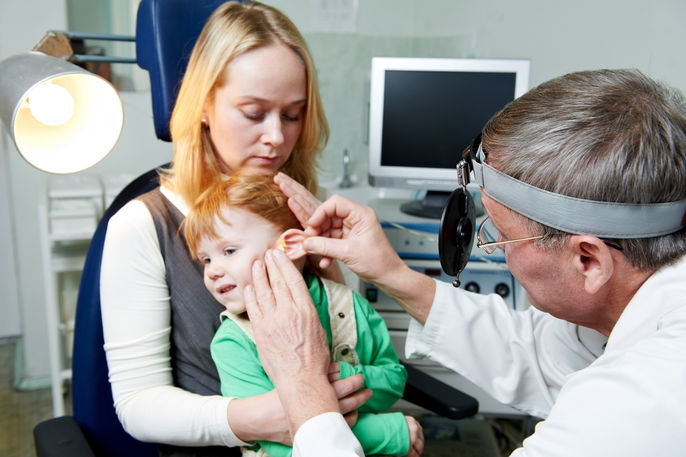Ear drainage is usually caused by a build-up of fluid, especially in babies under 2. In adults, it it usually the result of a cold, sinusitis, or allergic rhinitis.
Having ear drainage can impact hearing, which can affect communication and language development in children. Adults will typically experience hearing loss, as well as muffled hearing and cracking noises in the ear.
If you think you may have discharge in the ear, you should consult a family doctor, ENT specialist or a pediatrician (for children) for assessment.

Common symptoms
Ear drainage can present with symptoms like:
- The sensation of a plugged ear
- Pain or discomfort in the ar
- Difficulty hearing
- Whistling or cracking sounds in the ear
Other symptoms that may emerge include loss of appetite, vomiting, fever and the release of a yellow or white fluid from the ear. In children, it can lead to speech delays if left untreated for long periods of time.
Confirming a diagnosis
If you suspect you may have ear drainage, you should consult an ENT specialist, family doctor or pediatrician.
To confirm a diagnosis, the doctor will evaluate your symptoms and assess the discharge from the ear, which can be observed through an otoscope. The doctor may also perform a tympanic membrane vibration test, as a lower vibration is usually associated with discharge in the ear.
Main causes
The most common causes of ear drainage include:
- Viral or bacterial infection, leading to inflammation in the ear and the production of discharge
- Frequents colds and flus
- Allergic rhinitis
- Sinusitis
- Enlarged tonsils
- Allergies
- Injury in the ear due to rapid pressure changes (also known as barotrauma)
- GERD
In addition, tumors and malformations in the face or palate are less common but can lead to discharge in the ears. Learn more about what causes ear discharge and what to do.
Treatment options
Treatment is aimed at eliminating the ear drainage and relieving symptoms, so that the patient can restore they full hearing.
Although ear drainage generally improves without any specific interventions, the doctor may prescribe medications with corticosteroids or antibiotics to treat the underlying cause.
In some cases, symptoms may persist or worsen even with treatment. In these cases, the doctor may recommend a surgical procedure to insert a drain in the ear to remove any discharge and present accumulation in the future.
Prevention measures
In small children, ear drainage can be prevented through breastfeeding. Antibodies that are naturally present in the breastmilk can help protect the baby from infections that cause ear infections and discharge. You should also avoid offering pacifiers and smoking near the child, as well as ensure the child's vaccines are all up to date.
It is important for adults and children to wash their hands frequently. Children and adults that are sick with rhinitis, sinusitis, GERD and allergies should be assessed by a doctor to ensure these conditions are well-managed and do not worsen.






























